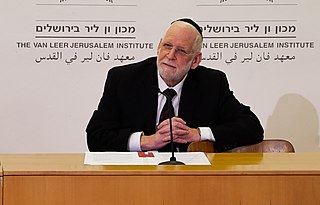
Yerushalmim (English: Jerusalemites) is an Israeli local civilian organization and political party in Jerusalem.

Yerushalmim (English: Jerusalemites) is an Israeli local civilian organization and political party in Jerusalem.
Yerushalmim was formed in 2008 by Rachel Azaria, who was elected that year to the city council of Jerusalem. [1] Yerushalmim is a municipal party whose members consist of secular and religious candidates and supporters, [2] aiming to turn Jerusalem into a more pluralistic and open city. Its main target is to improve the life quality of the residents, together with battling radicalization and inequity in the public arena.
The party was established in 2008 by its current leader Rachel Azaria in an effort to contend in the municipal Elections in Jerusalem. The organization contended in co-operation with the Hitorrerut Be'Yerushalaim party, turning to the young secular and religious audiences in the city, and won two seats in the city council, attracting 16,692 votes.
Aaron Leibowitz, who created a rebel kosher certification outside of the Chief Rabbinate, and Fleur Hassan-Nahoum were two of their councilors. [2]

The Israeli system of government is based on parliamentary democracy. The Prime Minister of Israel is the head of government and leader of a multi-party system. Executive power is exercised by the government. Legislative power is vested in the Knesset. The Judiciary is independent of the executive and the legislature. The political system of the State of Israel and its main principles are set out in 11 Basic Laws. Israel does not have a written constitution.

Jerusalem Day is an Israeli national holiday that commemorates the "reunification" of East Jerusalem with West Jerusalem following the Six-Day War of 1967, which saw Israel occupy East Jerusalem and the West Bank, effectively annexing the former. It is celebrated annually on 28 Iyar on the Hebrew calendar, and is marked officially throughout Israel with state ceremonies and memorial services.
Jewish leadership has evolved over time. Since the destruction of the Second Temple in Jerusalem in 70 CE, there has been no single body that has a leadership position over the entire Jewish diaspora. Various branches of Judaism, as well as Jewish religious or secular communities and political movements around the world elect or appoint their governing bodies, often subdivided by country or region.
Jewish political movements refer to the organized efforts of Jews to build their own political parties or otherwise represent their interest in politics outside the Jewish community. From the time of the siege of Jerusalem by the Romans to the foundation of Israel the Jewish people had no territory, and, until the 19th century they by-and-large were also denied equal rights in the countries in which they lived. Thus, until the 19th century effort for the emancipation of the Jews, almost all Jewish political struggles were internal, and dealt primarily with either religious issues or issues of a particular Jewish community.
Religion in Israel is manifested primarily in Judaism, the ethnic religion of the Jewish people. The State of Israel declares itself as a "Jewish and democratic state" and is the only country in the world with a Jewish-majority population. Other faiths in the country include Islam, Christianity and the religion of the Druze people. Religion plays a central role in national and civil life, and almost all Israeli citizens are automatically registered as members of the state's 14 official religious communities, which exercise control over several matters of personal status, especially marriage. These recognized communities are Orthodox Judaism, Islam, the Druze faith, the Roman, Armenian Catholic, Maronite, Greek Catholic, Syriac Catholic, Chaldean, Greek Orthodox, Syriac Orthodox, Armenian Apostolic and Anglican churches, and the Baháʼí Faith.
Jewish religious terrorism is religious terrorism committed by extremists within Judaism.

The Chief Rabbinate of Israel is recognized by law as the supreme rabbinic authority for Judaism in Israel. The Chief Rabbinate Council assists the two Chief Rabbis, who alternate in its presidency. It has legal and administrative authority to organize religious arrangements for Israel's Jews. It also responds to halakhic questions submitted by Jewish public bodies in the Diaspora. The Council sets, guides, and supervises agencies within its authority.

In Israel, marriage can be performed only under the auspices of the religious community to which couples belong, and inter-faith marriages performed within the country are not legally recognized. However, marriages performed abroad or remotely from Israel must be registered by the government. Matrimonial law is based on the millet or confessional community system which had been employed in the Ottoman Empire, including what is now Israel, was not modified during the British Mandate of the region, and remains in force in the State of Israel.

Eliyahu Yosef She'ar Yashuv Cohen was the Ashkenazi Chief Rabbi of Haifa, Israel and the President of its rabbinical courts (1975–2011).

Nir Barkat is an Israeli businessman and politician currently serving as Minister of Economy. He served as mayor of Jerusalem between the years 2008–2018.

Yitzhak Yosef is the Sephardi Chief Rabbi of Israel, the rosh yeshiva of Yeshivat Hazon Ovadia, and the author of a set of books on halakha called Yalkut Yosef.

Aryeh Stern is the Ashkenazi Chief Rabbi of Jerusalem, a member of the Chief Rabbinate Council of Israel, and the chief editor of the Halacha Brura and Berur Halacha Institute.
Religious relations in Israel are relations between Haredim, non-Haredi Orthodox, Karaite, Ethiopian, Reform, Conservative, and secular Jews, as well as relations between different religions represented in Israel. The religious status quo, agreed to by David Ben-Gurion with the Orthodox parties at the time of Israel's declaration of independence in 1948, is an agreement on the role that Judaism would play in Israel's government and the judicial system. Tensions exist between religious and secular groups in Israel.

Rachel Azaria, is an Israeli politician who served as a member of the Knesset for Kulanu. She previously served as deputy mayor and member of the Jerusalem City Council.

Naftali Rothenberg is an Israeli scholar, rabbi and author. He is known for his studies on the wisdom of love in Jewish Canonical literature and his inclusive leadership in the Israeli rabbinate.

Fleur Hassan-Nahoum is an Israeli politician and policy maker. She currently serves as Deputy Mayor of Jerusalem in charge of foreign relations, international economic development and tourism. She is also the co-founder and founding member of the UAE - Israel Business Council.

Ne’emanei Torah Va’Avodah (Hebrew: נאמני תורה ועבודה is a nonprofit organization in Israel that focuses on education research and policy in the Religious Zionist community. The organization supports democratizing the State-controlled religious services, so that the public plays a greater role in religious decision making and functions.

The 2018 Jerusalem mayoral election was held on 30 October and 13 November 2018 to elect the mayor of Jerusalem.
Elections are held in Jerusalem to elect the city's mayor. Currently, such elections are regularly scheduled to elect mayors to five-year terms.